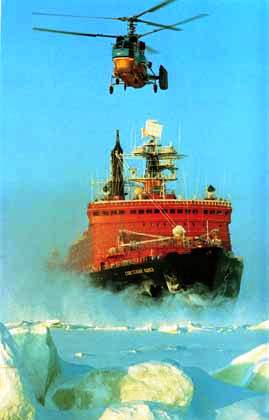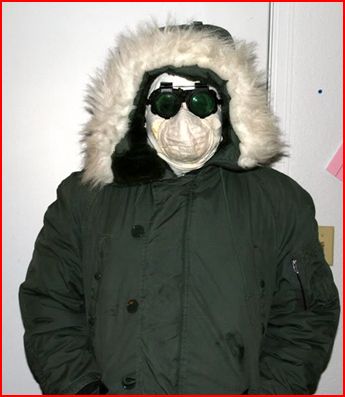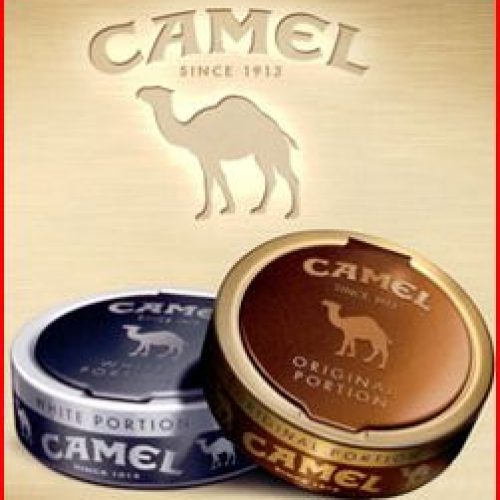THE NANNY STATE: RUSSIAN STYLE – Introduction
Preface: Andrew Romeo and Russia
Having moved from the mother’s love of an international ‘big tobacco’ job at Gallaher, to the aggressive, tactical point-and-shoot “small-fish” job as a small snus company director in Scandinavia (Taboca AS), I now find myself in Russia. Again.
Russia, for me, is where my career started. I studied the language in the 1980s at school and at Georgetown University, traveling to the then USSR first as a wide-eyed teenage tourist in 1982, and then as full-fledged student of Russian for a semester in 1985.
In 1991, the wall came down, and, working for my father in restaurants in NYC at the time, I took summer jobs in Russia. In 1992, I worked aboard a re-fit Russian nuclear icebreaker,  , as a restaurant manager for American tourists going to the North Pole, and in 1993, worked for an English Tour company running river cruises between Moscow and St. Petersburg.
, as a restaurant manager for American tourists going to the North Pole, and in 1993, worked for an English Tour company running river cruises between Moscow and St. Petersburg.
I was hired by Pepsi-Cola in Russia in September 1994, first as an Operations Manager for a fast-food concept in Moscow, but was transferred to the beverage division in 1996 to aid in the company’s regional expansion out of Moscow and St. Petersburg and into the wider world of Russia.
In 1997, I was hired by Liggett-Ducat (LD!), and when it was bought by Gallaher Group, worked in Russia until 2003 as Sales Director, when I left to head up Poland, and then Sweden/Scandinavia.
Russia holds a special place in my heart. I have seen it in its glory, and with its pants way down. Its history is the best book you’ve ever read, and its secret calling as the true bridge between Europe and Asia is obvious not only in its physical location, but in that same history of Tartar invasion and occupation. 70 years of Soviet ‘domination’ and the ensuing reforms almost decimated the country, but it is now rising again. However, Russia’s future prominence on the world stage is purely dependent on its ability to rescue itself from decades of genocide, war and corruption, and post-Soviet greed.
Oddly enough, as a writer on the most prominent snus site in the world, I am going to begin sending out my impressions of this crazy place to its honorable readership. I will try, and succeed, in discussing consumer goods as I do, but I hope to give readers a glimpse into this crazy and wonderful place that will be romantic, funny, dystopian, and mind-boggling. As they say, “Umom, Rossiyu ne Ponyat’ “ (‘One can never understand Russia with just the mind’). Hopefully, I can convey what that means in my next set of articles.
By the way, I am now working as a Sales and Distribution consultant to a long drinks company in St. Petersburg, called “Bravo Premium LLC.” We make canned/bottled Gin & Tonic, plus various low-alcohol fruit and energy drinks. We also have the license from Diageo to produce a fine Gordon’s G&T product. We are also the leaders in female long drinks in Russia with “AMORE” champagne cocktails!
A Bit About Russian Life
There was once a country, one thousand years old, called, at first, Rus’, and then known throughout the world as Russia and then, briefly, the Soviet Union. Expanding from Kiev and the banks of the Dniepr’ north to Moscow, and eventually as far east as east can go, Russia endured centuries of occupation from the Tatars, constant threats from Europe, and recent cataclysmic wars within Europe which cost them millions of lives.
Russia also lived as a great empire, having, at its greatest, and most nefarious time, control of the bulk of Eastern Europe (post WWII until 1989-1991) until the girth of economic inertia which was modern Communism forced it to collapse like a bloated piñata filled with bad intentions.
 And the USSR was thus signed out of existence in 1991 (signed out of existence! Holy Crap! Remember?) after its General Secretary, Mikhail Gorbachev, returned home from the Crimea to Moscow from a failed coup d’état . State enterprises were auctioned off to their workers, and workers, looking to buy scarce food for their families, sold their shares at discounted prices to some forward thinking individuals, who then went on to sell whole enterprises on for massive profits. These became the “oligarchs:” billionaires who ran over the people like steamrollers. It was a US-created model that worked in Poland in 1989. Poland, with its pre-Soviet history rooted in democracy, did well with it. Russia, with no history of democracy whatsoever, had a party for the rich and burned the rest.
And the USSR was thus signed out of existence in 1991 (signed out of existence! Holy Crap! Remember?) after its General Secretary, Mikhail Gorbachev, returned home from the Crimea to Moscow from a failed coup d’état . State enterprises were auctioned off to their workers, and workers, looking to buy scarce food for their families, sold their shares at discounted prices to some forward thinking individuals, who then went on to sell whole enterprises on for massive profits. These became the “oligarchs:” billionaires who ran over the people like steamrollers. It was a US-created model that worked in Poland in 1989. Poland, with its pre-Soviet history rooted in democracy, did well with it. Russia, with no history of democracy whatsoever, had a party for the rich and burned the rest.
The rest of Eastern Europe went back to Europe, most notably with the re-unification of Germany (another ‘‘holy crap!” moment), and cost uncounted zillions of Deutschmarks to dig them out of the communist ditch.
The western companies flowed in throughout the 1990s, and capital was around for almost anything. A debt crisis in 1998 and the current economic recession (after a boom based on the price of oil, which Russia is full of, by the way) have left Russia feeling strong on the world stage these days. Russia is a powerhouse getting stronger, with two guys from St. Petersburg seemingly running it more and more efficiently, with less and less opposition (PM Vladimir Putin and young President Medvedev).
Russian history reads like a great novel. Go buy it.
I’ve summarized it in gross general terms because I am an American living here. And, contrary to what one might think in the US, I feel surprisingly free.
Tobacco:
Restaurants and bars are still very smoker-friendly (42% smoke here, more unofficially). Smoking is actually a part of national culture (with drinking), and while drinking has slowed, smoking is steady at 300b sticks per year.
Drinking:
Russians are heavy drinkers. The male life expectancy level is still 57 years old (!), and drinking constitutes a higher percentage of deaths than smoking. Much is due to accidents occurring from drunkenness. Not just accidents behind the wheel, but others as well, including freezing outside at night in the winter (this winter has been below zero F for months across the country).
President Medvedev has stated a goal to reduce drinking substantially in the next decade. Hours for sale of spirits (above 17%) have been reduced, and outdoor kiosks will soon not be able to sell anything stronger than beer. There is a huge counterfeit vodka market in Russia as well, which is the primary target of the latest crackdown. Many alcohol-related deaths are from poisonous ‘basement-distilled’ vodka.
Guns:
Russians hunt. They hunt everything from rabbit to fox, deer and bear. Additionally, with a draft still in place, most men know how to use guns. Also, you won’t find lobbyists from gun companies in Moscow (like the NRA in the US). The urban crime level is still shockingly low in major cities, and the primary murder weapons are still knives and axes.
Consumerism:
Russians are told on TV what’s good to eat, and what’s bad. Smoke and drink less, eat less fat, drink water, eat your veggies and exercise. Russians then continue to eat tons of salt (pickled/preserved veggies) and fat (fatty meats, sala (pure fat), and heavily salted and fatty soups. They also have a wonderful culture of over-feeding and watering guests.
Labeling here is still sub-par. On a recent visit to my local shop, I could not find any juice in the “juice” aisle. It was all juice drinks with varying concentrations of juice, plus sugar and preservatives. The biggest brand, “Dobriy” has a “100%!” label on the front next to the word “kachestvo” or “quality.” NOT 100% juice.
Not unlike the US in the 1950s and 1960s, there is an obvious campaign to get the population to drink more milk. But a recent trip to a major supermarket showed a whole spectrum of dairy products, and so much of it was dedicated to bio-active bacteria products, I was driven to buy a bottle of vodka instead (same diuretic effect, over a much shorter time period).
Russians are inundated by brands, both foreign and domestic. Many domestic companies are now foreign-owned (the entire beer industry, cigarettes, cleaning supplies, for example). Improved quality and choice have turned the Russians into educated, but skeptical consumers. Many still seek out products from their local factories/producers, but globalization is having its effect here as well.
Randomness/Hugeness of Russia:
Walking down the street, I can be stopped by a cop for an ID check. As a Russian-speaking American, I usually get off with good conversation and a smile. If you have darker skin, you will be scrutinized, regardless of legal status, unless you are a tourist with required documentation. And then you’ll still be scrutinized. My best sales manager in Russia is Nigerian. He’s lived here 25 years, is married to a Russian woman with a daughter in medical school. He is a naturalized resident, and still gets treated like a second-class citizen.
There is a certain wildness to this country. Its massive size and diversity tend to be diametrically opposed to the concept of centralized rule of law. With improved communication, Vladimir Putin has managed to reign in rogue territories and fire/replace ambitious local governors with his own loyal subjects (“Federal Administrative Regional Governors”)
The wildness remains though and the people feel, in a way, a lot like Americans. The frontier to the east was conquered from Europe to the Pacific (one the Russians had conquered the Tatar invaders), and the local peoples were integrated forcefully into society, and live happily in their own independent and increasingly powerful mini-republics. However, here, restless republics are bombed to dust (Chechnya) while cooperative ones prosper (Tatarstan, Bashkortostan) or stagnate (Chuvashia, Mari-El).
I flew ten hours from St. Petersburg in Europe to Khabarovsk (near the Sea of Okhotsk in Eastern Asia) last night. Talk about ‘sea to shining sea,’ Russia has it too, with lots more frequent flier miles.
Taxes
Russians of all incomes are taxed at 13%. This is because it gets the rich to pay, and it gives the bulk of the population and businesses here an incentive to get legitimate. Russia’s underground economy has always thrived, and many businesses are still run by cash and bribes.
During the wholesale looting of the ex-Soviet Union in the early 1990s by the new Russian rich, billions of dollars were transferred abroad. Under Vladimir Putin, amnesties were put in place in the early 2000s to repatriate this cash, and much of it went into construction and the boom that was to come.
There is very much a feeling here that paying taxes is the same as bribing a government official. The roads are still crumbling, and the infrastructure has not benefitted. The government is an overstuffed bureaucracy of fat cats. Taxes simply make them fatter. Government infrastructure spending is utterly corrupt.
That feeling is based on what could be construed as the truth.
To be continued…
ANDREW ROMEO
An Insider’s Perspective
Reporting from Russia for SnusCENTRAL.org
About author
You might also like
A Different Look at Swedish CAMEL Snus
This was not intended to be my first article, but as someone who ran Gallaher Sweden for two years (2005-06), I can offer up some perspective on Swedish CAMEL Snus,
Those DAMNED ICELANDISTS!
The Long Volcanic Ash Plagued Wait for Home I’m sick. Sick and tired of those volcano-cloud apologists who won’t let us get on our damned planes and do the shit
The Big Sleep: Sweden in July
This article is not about tobacco. It is not about regulation, Big Pharma, flavors, or Internet trafficking of legal tobacco products. It’s about Sweden. In July. Today, the 19th of



